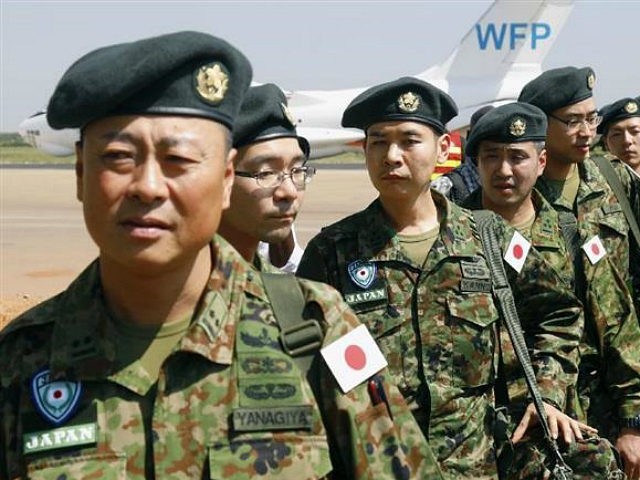A survey published Sunday found that over half of Japanese voters support amending the pacifist constitution to legitimize the Self-Defense Forces (SDF), the nation’s armed forces, by giving them a formal role in the government.
The survey’s publication followed yet another Chinese incursion into Japan’s territory in the East China Sea, where both countries claim the uninhabited but resource-rich Senkaku Islands.
When asked, “Do you think it is necessary to revise Article 9 to clarify the SDF?” 56 percent of respondents said yes to pollsters working for Japanese media outlets The Mainichi Shimbun and Kyodo News. Article 9 currently reads: “land, sea, and air forces, as well as other war potential, will never be maintained.” The SDF consists of all three such forces, can only operate in a defensive manner currently, and is not mentioned anywhere in the constitution.
The Mainichi newspaper notes that this does not necessarily mean that Japanese people are currently more supportive of keeping a standing army and that poll results vary significantly when pollsters provide respondents the option of answering that they are not sure. At 32 percent, the answer “not sure” to the question on whether Japan should amend its constitution to provide for the SDF took the lead, while “support,” at 28 percent, was the least popular.
Prime Minister Shinzo Abe announced in a May 3 message that he would more aggressively pursue the amending of the constitution to mention the SDF, defining it as a necessary force kept to the smallest size possible to keep Japan safe from foreign invasion.
The amendment would not change the text of Article 9 that prevents Japan from keeping a standing army, possibly relying on the argument that the SDF would remain too small to have “war potential,” even if it fits the definition of “land, sea, and air forces.” In his message, Abe argued that most of the nation’s constitutional scholars considered the current existence of the SDF unconstitutional, a situation that required fixing.
On Sunday, Abe announced on a radio program that he would seek to amend the constitution by the end of 2017. “I want the [ruling Liberal Democratic Party] LDP to discuss (the amendment) thoroughly, compile a plan within this year and present it to the public… I’d like to know whether (the plan) will garner public support,” he said. Abe made clear he does not wish to amend the constitution without the Japanese public supporting it: “I want people to make a judgment.”
In December, Japan approved its largest defense budget in history, going to, among other purchases, “six additional F-35A Lightning II Joint Strike Fighters… four Bell Boeing V-22 Osprey tilt-rotor aircraft… 11 AAV7 amphibious assault vehicles, and an additional Soryu-class diesel-electric attack submarine.”
An SDF on stronger legal footing would likely have a broader range to act in the face of the growing threat of Chinese expansionism in the region. The Chinese government has repeatedly taken action to establish its ownership of the Senkaku Islands, which China calls the Diaoyu, though it has failed to impose its Air Defense Identification Zone (ADIZ) over the islands.
The ADIZ requires all non-Chinese aircraft to identify itself to China, which would require Japanese aircraft flying over domestic territory to tell a foreign government its whereabouts. Any attack on a Japanese plane would require the United States to attack China by treaty, however, a possibility that has kept Beijing at bay.
Last week, however, the Chinese Coast Guard entered Japanese territory near the Senkakus accompanied by a drone. Japan scrambled fighter jets in response, and the nation’s Defense Minister Tomomi Inada issued a stern statement accusing China of “escalating the situation unilaterally, and this is totally unacceptable.”
“A drone flight from a Chinese government ship that entered our territorial waters is totally unacceptable as we think it will lead to the escalation of the situation. The case is a serious violation of our national sovereignty,” Inada concluded.
The Chinese Foreign Ministry has dismissed Japan’s protests. “I would like to stress again that Diaoyu Dao and its affiliated islands are China’s inherent territory,” spokeswoman Hua Chunying said on Friday. “It is our inherent right to organize the Chinese Coast Guard vessels to conduct normal patrols, law enforcement and relevant activities. As for the so-called representation or complaint made by Japan, of course we will not accept it.”
Hua announced on Monday that China has also opened investigations into six Japanese citizens suspected of “engaging in illegal activities in China,” without elaborating.
“We were notified by China that three Japanese men each, six in total, had been detained in March by the Chinese authorities in Shandong Province and Hainan Province,” Japanese Chief Cabinet Secretary Yoshihide Suga confirmed. While Kyodo News reported that the men may be suspected of espionage, Reuters notes this has yet to be confirmed by either side.

COMMENTS
Please let us know if you're having issues with commenting.